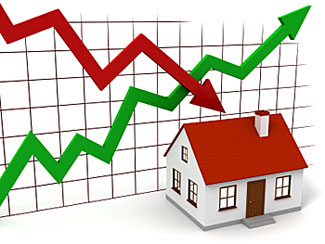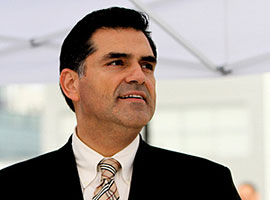Assessor hit for faulty forecasts
May 16, 2012
 When it comes to forecasting the rise and fall of home prices, the Los Angeles County Assessor’s Office needs to get its house in order.
When it comes to forecasting the rise and fall of home prices, the Los Angeles County Assessor’s Office needs to get its house in order.
That was the conclusion of a team of consultants hired by the county to investigate how the assessor came to produce two widely different predictions of money that would be generated by this year’s property taxes. In one fell swoop, the amount of growth forecast for property values plunged from $18.6 billion in December to $5.1 billion in April—an unwelcome surprise for financially-strapped local government entities, including the county, that rely on the funds.
An irate Board of Supervisors last month called the disparity shocking and unprecedented, and ordered a top-to-bottom audit of the office run by Assessor John Noguez, who already was under fire for allegedly giving special treatment to certain property owners, an accusation he has denied.
On Tuesday, the first phase of that audit was presented to the supervisors, and it did not paint a flattering portrait of assessor operations.
Consultants from the firm Rosenow Spevack Group found numerous flaws in how the two forecasts were reached—from failing to account for home price volatility at the close of last year to making errors in math. RSG, which was retained by the county’s auditor-controller, concluded that the December forecast of 1.77 percent revenue growth was too high and that the April forecast of .49 percent growth was too low.
Based on more complete information, RSG and the Assessor’s Office now agree that rate of growth in property tax revenue will be closer to 1.14%.
The most significant forecasting error, according to RSG, was the assessor’s failure to recognize, and account for, an unexpected decline in value for hundreds of thousands of parcels in the final quarter of last year. The assessor’s office had based its December forecast on information generated between January and September 2011, when prices were relatively stable, without examining available sales data or economic analyses for the latter part of the year. The result: an overly optimistic forecast, Jim Simon of RSG told the board.
Mistakes were also made in the April forecast, he said, including an overstatement of the estimated drop in the property tax roll because of “a calculation error.”
In a letter accompanying RSG’s report, Auditor-Controller Wendy Watanabe noted that, during the past several years, the assessor’s office has been hit with numerous retirements in key management roles, “which has resulted in significant turnover in the staff who prepare the roll forecasts.” Watanabe’s office is now examining the management of the assessor’s office, including whether it has been hurt by the controversies surrounding Noguez, who, along with other members of his staff, are under investigation by the District Attorney’s public integrity unit.
That a controversy over forecasts could even flare seems unique to Los Angeles government.
According to RSG, it appears that no other assessor in the state is producing multiple forecasts like Los Angeles. For 20 years, the L.A. County assessor has been producing three of them as a way to help the county’s Chief Executive Office prepare the county’s preliminary budget. Under state law, an assessor is only required to produce an annual forecast in May, if asked to do so by a governing body of a taxing agency.
“Their primary function is to be assessors” evaluating properties, Simon said, “not forecasters.”
Still, with the likelihood that multiple forecasts in Los Angeles County will continue, Simon’s team suggested a number of ways for the assessor to increase accuracy. They include: using the most current data available; evaluating properties on a more geographic-specific level, obtaining input from economists and other experts, and providing a range of values in forecasts, instead of settling on a specific number.
Posted 5/16/12













 405 bridge work causes a stink
405 bridge work causes a stink
